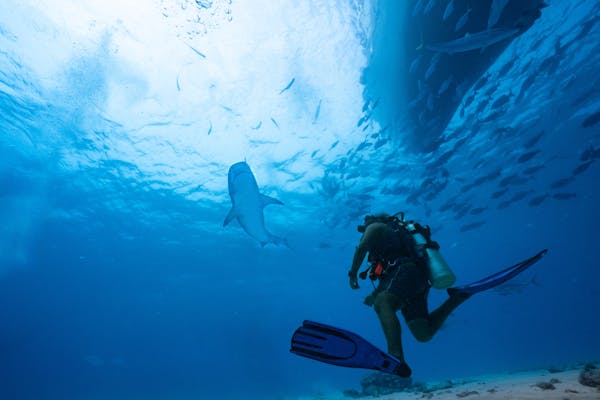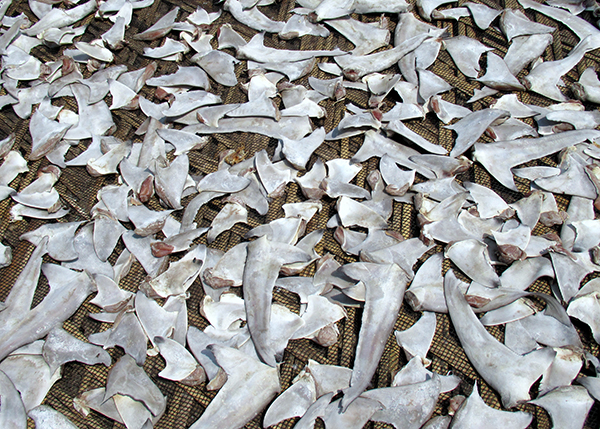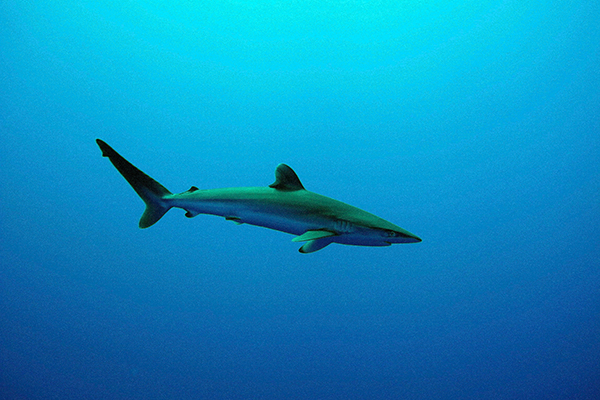Researchers seek to prevent ‘destructive proposals’ that include a ban on diving

Brazilian authorities must take a science-based approach to shark conservation in Marine Protected Areas (MPAs), urges a new study published in Perspectives in Ecology and Conservation.
A new paper with authors from the University of São Paulo in Brazil, Charles Darwin University, the California Academy of Sciences in San Francisco and Ghent University in Belgium has argued proposals – such as shark culling and the prohibition of scientific diving – could undermine critical conservation efforts in MPAs. Experts warn that such extreme reactions to bite incidents and population growth will undermine the recovery of the fish.
“Shark population recovery is among the main goals of conservation initiatives, and scientific research offers valuable tools to assess the outcomes of regulations and ecological progression of MPAs,” said Dr. Osmar Luiz, co-author and CDU Research Fellow for the Research Institute for Environment.
Luiz said there was a disconnect between the goals of conservation efforts in MPAs and the reaction to the desired outcomes of these efforts. He cited two recent controversies highlighting this, a 2022 incident with a tiger shark inside marine national park Sueste Bay, which has led to “destructive proposals” including shark culling. The other is the decision to prohibit scientific diving in the St. Peter and St. Paul’s Archipelago area due to “life-threatening risks” to diving researchers from an increased shark population.
“The prohibition of scientific diving and proposals for shark culling have been made without considering any scientific evidence or reasonable criteria,” said Luiz. “Shark culling does not necessarily control the number of shark bites and has the potential to catch a high diversity of undesired and endangered species. The lack of surveillance and monitoring of sharks could quickly reverse the progress made by conservation efforts and monetary investment in the past few decades in Brazil.”
Dr. Luiz said new strategies and solutions were needed for shark management and should be grounded in a science-based approach that aligns with conservation goals, with potential economic benefits.
“There is a need for studies to assess the reasons behind recurrent shark incidents,” said Luiz. “Understanding shark behavior, habitat use and abundance could provide insights into why these incidents are occurring and how they can be prevented.”
Luiz also said the potential for further incentives for sustainable activities such as shark diving tourism should be explored. These activities not only have economic benefits but can also contribute to conservation efforts by raising awareness and appreciation for sharks. Lastly, he stressed that the immediate resumption of scientific diving and long-term underwater monitoring programs in research stations is “crucial.”
“Interaction between sharks and SCUBA divers are rare, and the activities that were recently stopped provide valuable data that can help assess the outcomes of conservation initiatives and the ecological progression of MPAs,” said Luiz.
Now that you've reached the end of the article ...
… please consider supporting GSA’s mission to advance responsible seafood practices through education, advocacy and third-party assurances. The Advocate aims to document the evolution of responsible seafood practices and share the expansive knowledge of our vast network of contributors.
By becoming a Global Seafood Alliance member, you’re ensuring that all of the pre-competitive work we do through member benefits, resources and events can continue. Individual membership costs just $50 a year.
Not a GSA member? Join us.
Author
Related Posts

Fisheries
Study: Effective fisheries management reduces extinction risk of sharks and rays
The extinction risk of sharks and rays can be significantly reduced with effective fisheries management and policies, says a Virginia Tech study.

Fisheries
Bangladesh moves to protect threatened sharks and rays
With sharks and rays critically endangered, the government of Bangladesh has amended legislation to reduce the extinction risk of the species.

Fisheries
Protecting fish and communities should be balanced, concludes study of Marine Protected Areas
A study finds that Marine Protected Areas must be "flexible and responsive" to successfully restore fish stocks without harming communities.

Fisheries
Fisheries management help tunas, billfishes recover, but extinction risk of sharks rises
New study suggests conservation and fisheries management help tunas and billfishes recover, but shark biodiversity continues to decline.



